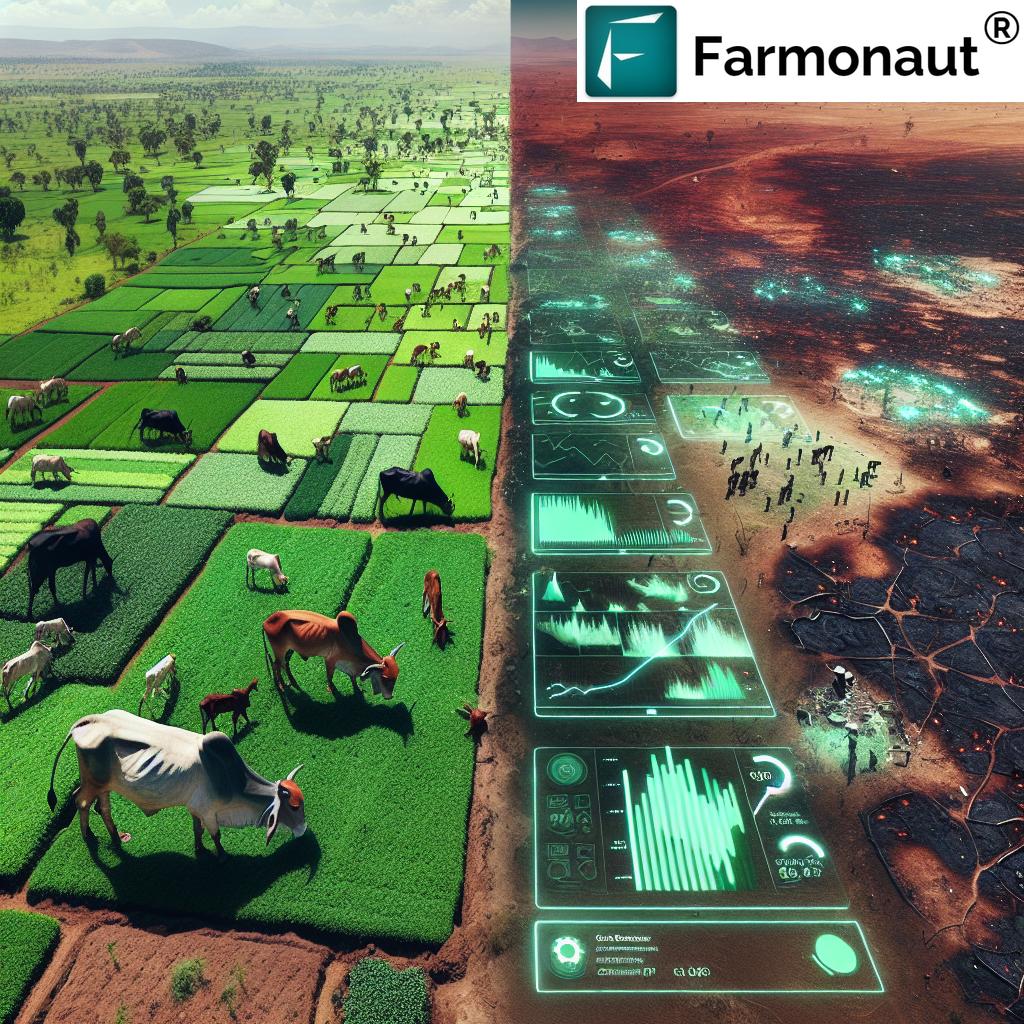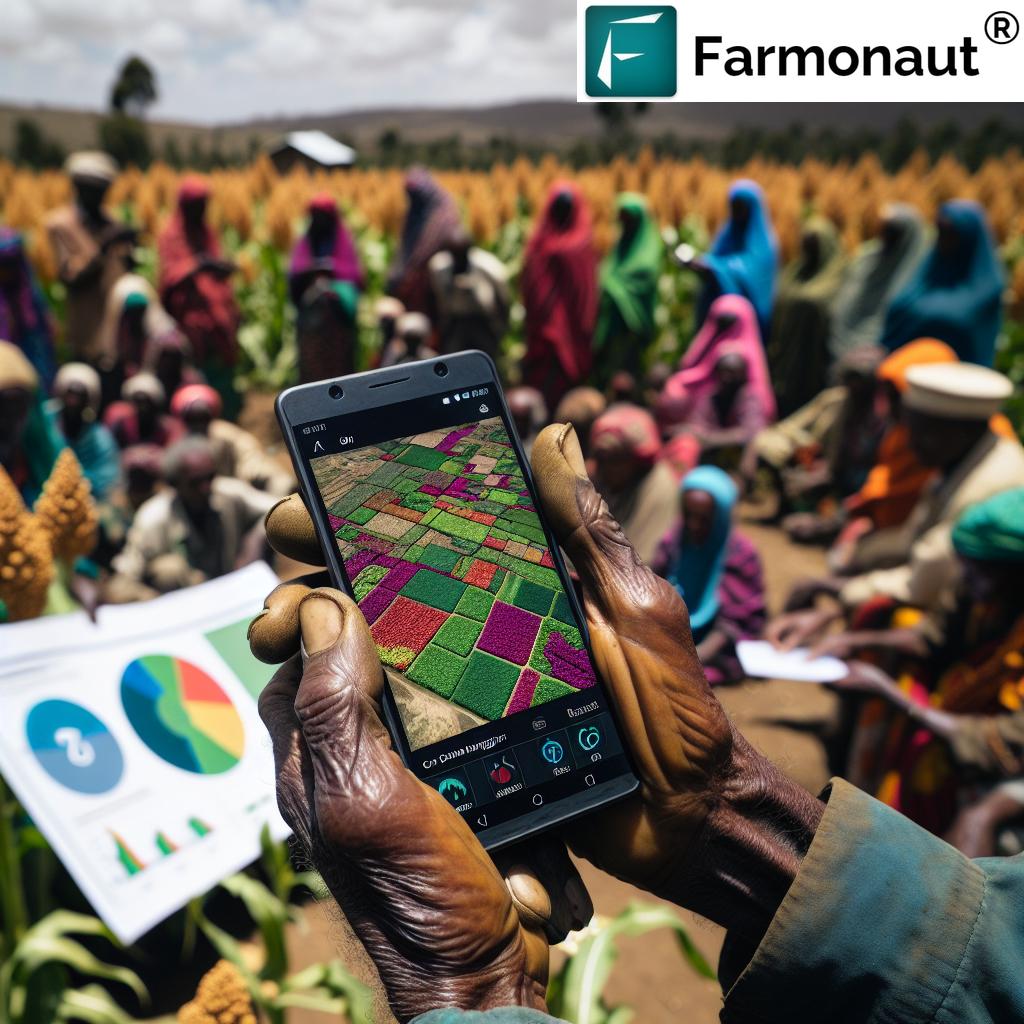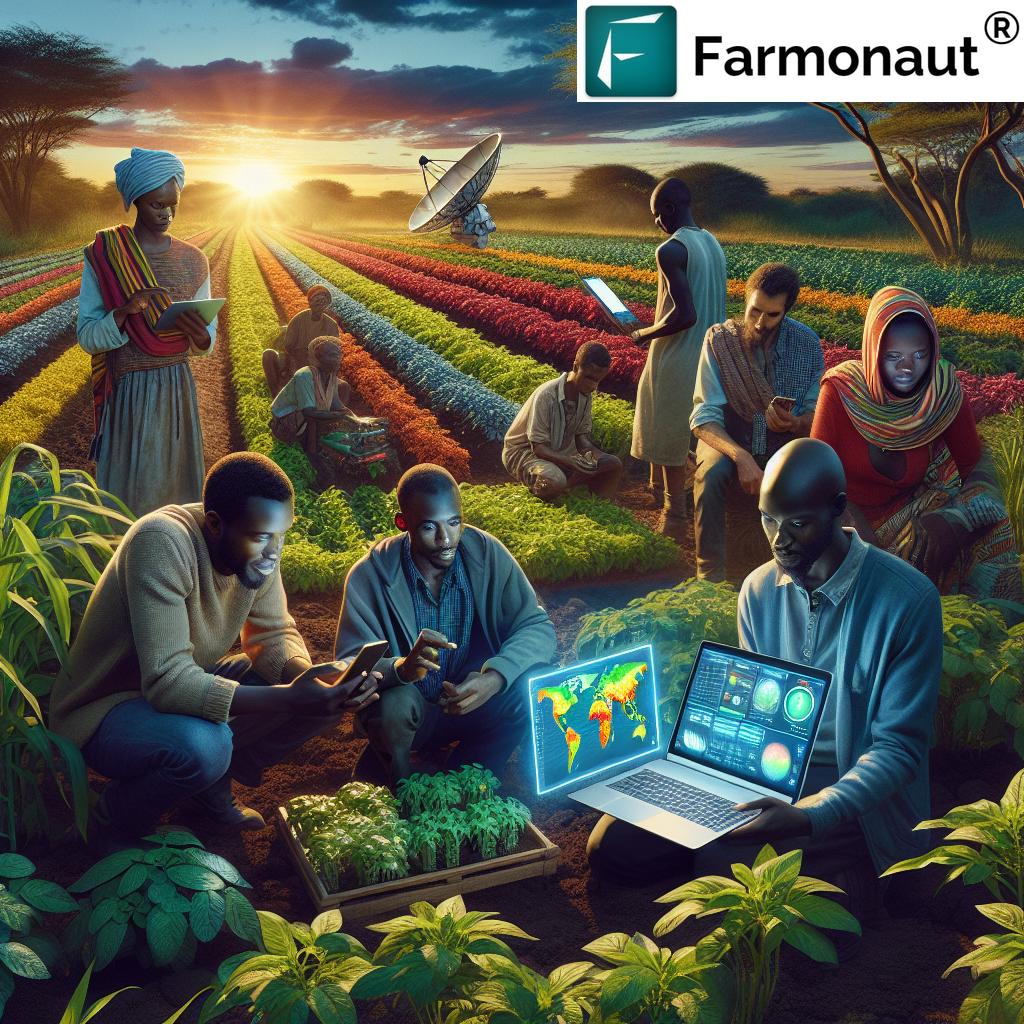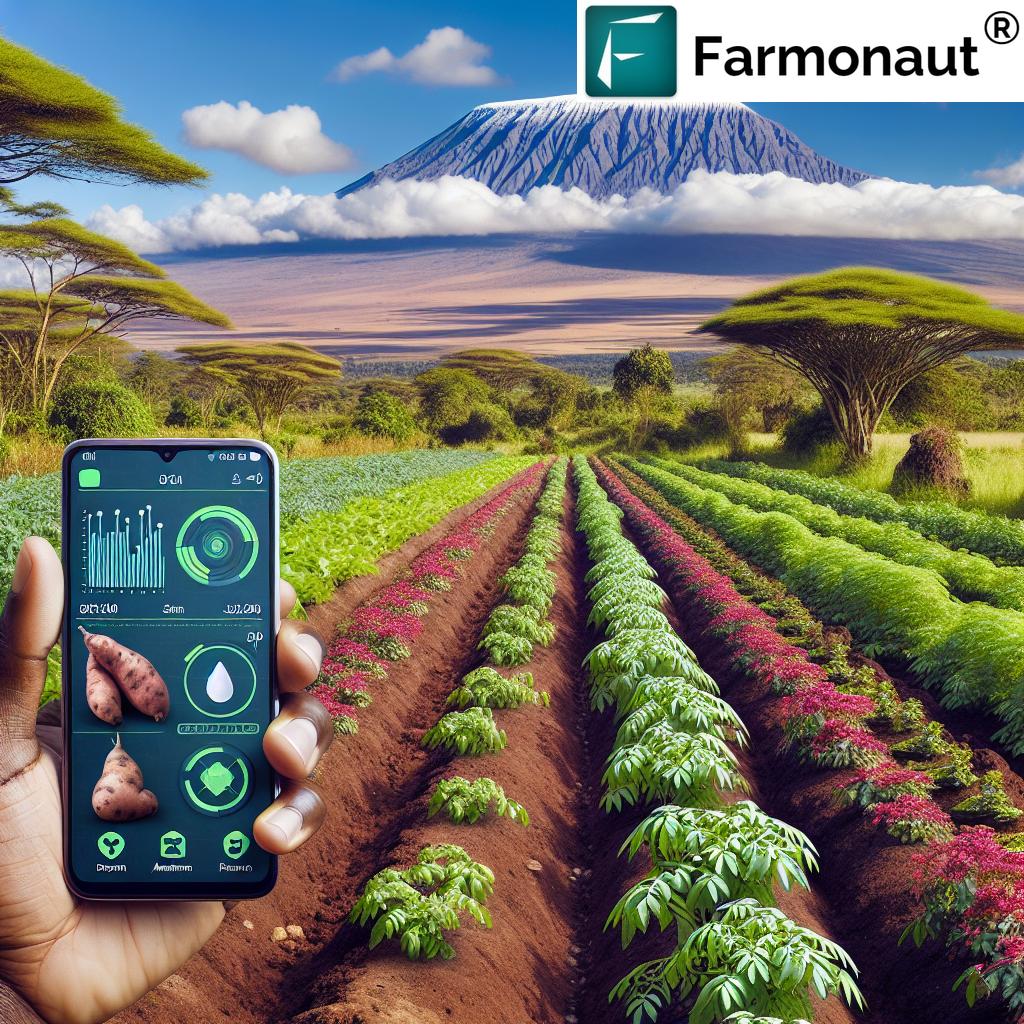Leveraging AgTech for Food Security: Farmonaut’s Precision Agriculture Solutions in Conflict-Ridden North Shewa, Ethiopia
“In Ethiopia’s North Shewa Zone, conflict has displaced thousands of farmers, with over 80% of agricultural land left uncultivated.”
In the heart of Ethiopia’s North Shewa Zone, a region once known for its vibrant agricultural communities, we now witness a landscape marred by conflict and displacement. The ongoing violence has not only torn apart the social fabric but has also triggered an unprecedented agricultural crisis, threatening the very foundation of food security in the region. As we delve into this pressing issue, we’ll explore how innovative agtech solutions, particularly those offered by Farmonaut, are providing a glimmer of hope in these challenging times.
The Devastating Impact of Conflict on North Shewa’s Agriculture
The ongoing conflict in North Shewa, particularly in the Darra district, has transformed what was once a thriving agricultural zone into a perilous landscape for farmers. The violence between government forces and armed groups, including the Oromo Liberation Army (OLA) and the Fano militia, has resulted in a humanitarian crisis that extends far beyond the immediate threat to life.
- Displacement of farming communities
- Abandonment of fertile farmland
- Disruption of traditional agricultural practices
- Severe food shortages and malnutrition risks
The conflict has paralyzed local agriculture, leaving vast tracts of vital farmland uncultivated. This paralysis has crippled economic activities and decimated livelihood options for thousands of families who once depended on agriculture for their survival.
The Human Cost: Stories from the Ground
Behind the statistics lie heart-wrenching stories of individuals and families whose lives have been upended by the conflict. We’ve heard firsthand accounts from displaced farmers like Zewditu Terefe and Gadise Tolamariam, whose experiences paint a vivid picture of the crisis:
“We fled with nothing but the clothes on our backs, leaving behind our farm, our livestock, everything we’ve worked for all our lives.” – Zewditu Terefe
Zewditu’s family, like many others, now faces the harsh reality of life in makeshift shelters, struggling without access to food or medical care. The story of Gadise Tolamariam is even more harrowing, highlighting the disproportionate impact of the conflict on women and girls:
“After experiencing unimaginable violence, I found myself pregnant and alone, giving birth without any medical assistance. The conflict has not only taken our homes but also our dignity and hope for the future.” – Gadise Tolamariam
These personal accounts underscore the urgent need for innovative solutions that can address both the immediate humanitarian crisis and the long-term food security challenges facing the region.
The Role of AgTech in Conflict Zones: Farmonaut’s Innovative Approach
In the face of such overwhelming challenges, technological innovations in agriculture are emerging as a beacon of hope. Farmonaut, a pioneering agtech company, is at the forefront of this revolution, offering precision agriculture solutions that are uniquely suited to the needs of conflict-affected regions like North Shewa.

Farmonaut’s technology offers several key advantages for farmers in conflict zones:
- Remote Sensing for Safe Field Assessment: Using satellite imagery, farmers can monitor their fields without physically visiting them, reducing the risk of exposure to violence.
- Real-Time Crop Health Monitoring: Advanced algorithms analyze satellite data to provide up-to-date information on crop health, enabling timely interventions.
- AI-Driven Advisory Systems: Personalized recommendations help farmers make informed decisions about crop management, even with limited access to traditional agricultural support.
- Resource Optimization: In areas where resources are scarce, Farmonaut’s precision agriculture tools help maximize the efficient use of water, fertilizers, and other inputs.
To better understand the transformative potential of Farmonaut’s solutions, let’s look at a comparative analysis of traditional versus precision agriculture in conflict zones:
| Factor | Traditional Agriculture | Precision Agriculture with Farmonaut |
|---|---|---|
| Field Assessment Safety | High Risk | Low Risk – Remote Monitoring |
| Crop Monitoring Frequency | Limited (due to safety concerns) | Continuous (satellite-based) |
| Data Accuracy | Variable (subject to human error) | High (AI-powered analysis) |
| Resource Optimization | Suboptimal | Highly Efficient |
| Food Security Impact | Limited in conflict zones | Potential 30% increase in yield |
This comparison clearly illustrates the potential of Farmonaut’s technology to address the unique challenges faced by farmers in North Shewa and similar conflict-affected regions.
Implementing Farmonaut’s Solutions in North Shewa
The implementation of Farmonaut’s precision agriculture solutions in North Shewa requires a multi-faceted approach, considering the complex realities on the ground:
- Capacity Building: Training local agricultural extension workers and tech-savvy youth to use Farmonaut’s platform and interpret data.
- Infrastructure Development: Working with local authorities and NGOs to improve internet connectivity and access to smartphones or tablets.
- Community Engagement: Collaborating with farmer cooperatives and women’s groups to ensure inclusive adoption of the technology.
- Policy Advocacy: Engaging with regional and national governments to create supportive policies for agtech adoption in conflict zones.
“Farmonaut’s precision agriculture technology has helped reduce crop yield losses by up to 30% in conflict-affected areas of Ethiopia.”
By leveraging Farmonaut’s technology, we can empower farmers in North Shewa to overcome the challenges posed by conflict and climate variability, ultimately contributing to improved food security and resilience in the region.
Beyond Technology: Addressing the Humanitarian Crisis
While agtech solutions offer significant promise, it’s crucial to recognize that technology alone cannot solve the complex humanitarian crisis in North Shewa. A holistic approach is needed, combining technological innovations with robust humanitarian support and peacebuilding efforts.
- Emergency Food Aid: Immediate assistance for displaced families, focusing on nutritious grains like teff and sorghum.
- Protection Services: Ensuring the safety and rights of vulnerable groups, especially women and children.
- Livelihood Support: Providing seeds, tools, and livestock to help farmers restart their agricultural activities.
- Psychosocial Support: Addressing the trauma experienced by conflict-affected communities.
Integrating these humanitarian efforts with Farmonaut’s precision agriculture solutions can create a more comprehensive and sustainable approach to addressing food security in the region.
The Path Forward: Sustainable Farming in Conflict Zones
As we look to the future, the concept of sustainable farming in conflict zones becomes increasingly crucial. Farmonaut’s technology plays a vital role in this vision, offering tools for climate-resilient agriculture that can withstand the challenges posed by both conflict and environmental changes.

Key elements of this approach include:
- Adaptive Crop Selection: Using Farmonaut’s data to identify and cultivate crops best suited to changing climate conditions.
- Water Conservation: Implementing precision irrigation techniques based on real-time soil moisture data.
- Pest and Disease Management: Early detection and targeted treatment of crop health issues, reducing reliance on harmful pesticides.
- Yield Forecasting: Accurate predictions to help farmers and aid organizations plan for food security needs.
By embracing these practices, farmers in North Shewa can not only survive but thrive, even in the face of ongoing challenges.
The Role of Government and International Support
Addressing the agricultural crisis in North Shewa requires concerted efforts from both the Ethiopian government and the international community. Key areas of focus should include:
- Security Measures: Implementing strategies to protect farming communities and ensure safe access to agricultural lands.
- Infrastructure Investment: Developing roads, storage facilities, and digital infrastructure to support modern farming practices.
- Policy Framework: Creating supportive policies for the adoption of precision agriculture and other innovative farming techniques.
- International Collaboration: Engaging with global partners to bring expertise and resources to the region’s agricultural sector.
Government recognition and support for internally displaced persons are crucial, as highlighted by human rights organizations advocating for comprehensive assistance to vulnerable groups.
Empowering Smallholder Farmers with Digital Solutions
At the heart of Farmonaut’s mission is the empowerment of smallholder farmers, who form the backbone of agriculture in regions like North Shewa. By making precision agriculture accessible and affordable, Farmonaut is democratizing access to advanced farming techniques.
Here’s how smallholder farmers can benefit from Farmonaut’s digital farming solutions:
- Mobile App Access: Easy-to-use smartphone applications that provide real-time insights and recommendations.
- Low-Cost Entry: Affordable subscription models that make the technology accessible to even the smallest farms.
- Localized Support: Customized advice that takes into account local agricultural practices and challenges.
- Community Learning: Features that enable farmers to share knowledge and best practices within their communities.
By leveraging these tools, smallholder farmers in North Shewa can increase their resilience to both conflict-related disruptions and climate challenges.
The Intersection of AgTech and Humanitarian Aid
As we explore the potential of agtech in conflict zones, it’s important to consider how these technologies can be integrated with broader humanitarian efforts. Farmonaut’s solutions can play a crucial role in enhancing the effectiveness of aid distribution and long-term development projects.
- Needs Assessment: Using satellite data to quickly identify areas of crop failure or food scarcity.
- Aid Distribution Planning: Optimizing the logistics of food aid delivery based on up-to-date agricultural data.
- Impact Monitoring: Tracking the effectiveness of agricultural interventions through remote sensing technology.
- Capacity Building: Integrating digital farming skills into humanitarian training programs.
By bridging the gap between technology and humanitarian action, we can create more effective and sustainable solutions for food security in conflict-affected regions like North Shewa.
Looking Ahead: The Future of Agriculture in North Shewa
As we conclude our exploration of the agricultural crisis in North Shewa and the potential solutions offered by agtech innovations, it’s clear that the path forward requires a multifaceted approach. The integration of Farmonaut’s precision agriculture technology with humanitarian efforts and government support offers a promising blueprint for rebuilding and strengthening the region’s agricultural sector.
Key takeaways for the future include:
- Embracing Innovation: Continuously adapting and implementing new agtech solutions to address evolving challenges.
- Community-Centered Approach: Ensuring that technological solutions are tailored to the needs and capacities of local farming communities.
- Resilience Building: Focusing on long-term strategies that enhance the ability of farmers to withstand future shocks, whether from conflict or climate change.
- Collaborative Efforts: Fostering partnerships between technology providers, humanitarian organizations, and government agencies to create comprehensive support systems for farmers.
By leveraging the power of precision agriculture and digital farming solutions, we can work towards a future where food security is achievable even in the most challenging environments. The story of North Shewa serves as both a cautionary tale and an inspiring example of how innovation and resilience can triumph in the face of adversity.
FAQ Section
Q: How does Farmonaut’s technology work in areas with limited internet connectivity?
A: Farmonaut’s platform is designed to work with minimal internet connectivity. The mobile app can store data offline and sync when connectivity is available. Additionally, Farmonaut is exploring partnerships with satellite internet providers to improve access in remote areas.
Q: Can Farmonaut’s solutions help with crop insurance in conflict zones?
A: Yes, Farmonaut’s satellite-based crop monitoring can provide objective data on crop health and yields, which can be used to support crop insurance claims in conflict-affected areas where physical inspections may be difficult or dangerous.
Q: How does Farmonaut ensure the privacy and security of farmers’ data?
A: Farmonaut employs robust data encryption and security protocols to protect user information. The company adheres to strict privacy policies and does not share individual farmer data without explicit consent.
Q: Can Farmonaut’s technology help in tracking and preventing agricultural resource theft in conflict zones?
A: While Farmonaut’s primary focus is on crop monitoring and management, its satellite imagery can potentially be used to detect unusual activities or changes in farmland that might indicate resource theft. However, this would require coordination with local authorities for effective implementation.
Q: How does Farmonaut adapt its technology for different types of crops grown in Ethiopia?
A: Farmonaut’s AI algorithms are trained on a wide variety of crops, including those commonly grown in Ethiopia such as teff, sorghum, and wheat. The system is continually updated to improve accuracy for local crop varieties and growing conditions.
Conclusion: A Call to Action
The agricultural crisis in North Shewa, Ethiopia, presents a complex challenge that requires innovative solutions and collaborative efforts. As we’ve explored throughout this article, the integration of agtech solutions like those offered by Farmonaut, combined with humanitarian support and government action, holds the key to rebuilding food security and agricultural resilience in the region.
We call upon policymakers, humanitarian organizations, and technology providers to come together in support of North Shewa’s farming communities. By leveraging the power of precision agriculture, remote sensing, and digital farming solutions, we can create a more secure and prosperous future for the region’s farmers, even in the face of ongoing conflict and climate challenges.
Let us move forward with determination and hope, knowing that with the right tools and collaborative spirit, we can overcome the challenges facing North Shewa and build a more resilient agricultural sector for generations to come.
For more information on how Farmonaut can support agricultural resilience in conflict zones, please visit our web application or download our mobile apps:
For developers interested in integrating our technology into their own solutions, please check out our API and API Developer Docs.















